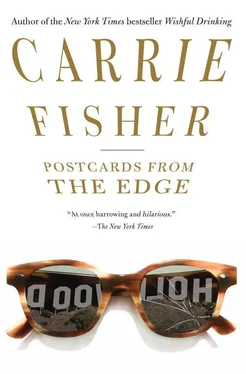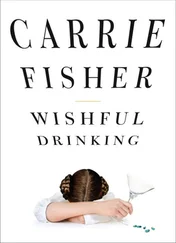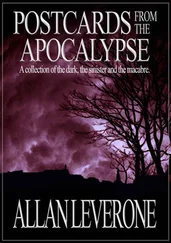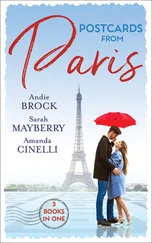It was true. Suzanne felt the biggest smell of her life. Marina passed a paper fan in front of Suzanne’s face to move the horrible vegetable peel fumes as they rose from the muck. After about fifteen minutes the stench died down, presumably taking with it a layer of Suzanne’s skin, so Marina removed the peel and began steaming Suzanne’s face for the deep pore work.
Suzanne hated the deep pore cleansing, but when you got down to it, that was really what facials were all about. She wondered what her skin would look like if she’d never had all these facials. Probably better. She’d probably ruined her skin’s ability to clean itself by getting it addicted to this whole process.
“Am I hurting you?” asked Marina disinterestedly.
“No, not really,” lied Suzanne.
“The nose and the chin are the worst part. We are almost done with the nose. It was very clogged. Are you using our cleanser?”
“Yes,” lied Suzanne.
“Well, you should use it three times a day,” said Marina sternly. “And use our scrub.”
“Okay,” said Suzanne. “Owwww!”
“Sorry,” said Marina without remorse. “The chin, you know, very sensitive.” She started to move under Suzanne’s chin onto her neck.
“No, no,” Suzanne said earnestly. “Leave that.”
“But it is a very big—”
“Just leave it,” she said adamantly. “Just do the part of my face the world sees, and leave the underbelly to me.”
“But—”
“It hurts too much and I don’t care enough, okay?” snapped Suzanne. “Leave it!”
“Okay,” sniffed Marina.
They finished the facial in silence, then Suzanne slipped off the little pink robe and paid the bill. She left Marina, whom she loathed and felt guilty for loathing, a big tip.
She decided to have the car washed. She always felt good when she got the car washed, like she was truly participating in her life. While she waited, she called her machine to check her messages. Mark Auerbach’s secretary had called about setting up a meeting for her on the new Spencer Matheisen picture, A Total Bust . Her dentist Dr. Gibbon’s assistant had called asking if she had forgotten she had an eleven-fifteen appointment for a cleaning. (She had.) She’d also had calls from Kate Rosenman, a producer friend of hers in AA, and her brother Thomas, who’d called from Turkey, where he was filming a documentary on the unearthing of Noah’s Ark. And, from New York, her friend Lucy Copeland had called from underneath a sleeping Scott Hastings—her newest married lover—“just to say hi.”
When she got back in her car, she noticed how clean the windshield was. She was going to feel good now, Suzanne thought. She was going to enjoy her life as though she was someone else living it, someone who had won living her life as a prize. Her house, her friends, her family, her clothes, her car… She was going to appreciate them as though she had had this whole other life before, and now she had won this one. She drove through the heart of Beverly Hills, down the palm-lined streets, listening to Steely Dan sing “Don’t Take Me Alive.”
By the time she got home, her determination to enjoy her life had been crushed under the weight of pre-party tension. She opened a Diet Coke, ate a miniature Tootsie Roll, called and left a message for Lucy—she knew she’d be out, but she wanted to go on record as having called—then went in to run her bath.
“Why can’t I look like Nastassia Kinski?” Suzanne thought, an hour and a half later, as she put the finishing touches on her makeup. She had read in Vogue that there was an operation that made your lips big like Nastassia Kinski’s. Unfortunately, it involved taking skin from your vagina and moving it to your mouth. Suzanne couldn’t quite bring herself to do this, fearing that it would ruin kissing for her. Still, it rolled around in her head for weeks as a vague possibility. She scrutinized her work and saw that she had disguised her blemish so well that it was now a highly conspicuous white spot, a headlight on her face.
She had a tendency to keep her chin down in her chest when her skin broke out. Even if people seemed to be looking in her eyes, she knew they were thinking, “Poor thing, she’s got a zit. Her life must not work.”
Sometimes when she looked in the mirror she thought, “Sure, that girl is attractive. She looks good.” As soon as she walked away from her reflection, though, she added, “But I’m not.” Her whole personality was designed to distract people from her looks. The fact that she was quite pretty—and that, on some level, she even knew it—made it all the more bizarre when she opened her mouth and Phyllis Diller came out.
She checked her outfit in her full-length mirror. With her tight blue skirt, with her top that snapped between her legs so that it looked tight, and especially with her stockings, she was definitely “dressed for them.” She stepped into her treacherous black heels, put on her black jacket, grabbed her blue bag, and took one last look at herself.
She sighed. “I look like a basketball with lips,” she thought. “An angry grape. A two-day-old balloon.”
“You look fine,” said her sane part, that tiny section of her brain that sat in the back and cheered.
“I look ready,” she thought, then said aloud, “Let’s party,” and strode off to her car. She switched on the ignition and “Burning Down the House” came blasting out of her speakers as she backed down the driveway.
She took the long way to Wallis’s house so she could have a nice, calming, deafening drive. She found she was now changing stations even when she found a song she liked. She had come to enjoy the quest for a good song more than the songs themselves. Interesting. She checked herself repeatedly in the rearview mirror as she drove.
When she was a block away she saw the parking attendants, dark men in red jackets and black pants. Suzanne saw the cars they’d already parked—the Porsches, the Jaguars, the Rollses—and suddenly panicked. She should have brought a date, she realized. Should have had her hair done. Should have worn a different dress, other earrings, less perfume. She got out of her car looking as casual as possible and turned it over to a total stranger. Looking at the lights on the lawn, she thought, “I could still leave. I could still turn around screaming and sobbing and grab my keys back from the man with strange sideburns and…”
Suzanne walked stoically up the imposing driveway, like a condemned man about to face a firing squad without cigarette or blindfold, to the huge, secluded stone mansion. A butler opened the door. She stood in the entrance for a moment experiencing waves of HPT—Hollywood Party Terror—then went in.
Under a large mirror was a silver tray containing tiny envelopes with the names of the guests on them. Suzanne smiled wanly at the butler and headed dutifully for the tray. After some graceful rummaging, she found her envelope. Her name was misspelled. The butler asked if she wanted anything to drink. “Does it show?” she replied, and ordered a stiff Diet Coke.
The wall next to the stairs was lined with art, lots of art. The house was clearly a showcase for this collection, and all the furniture was in bland, don’t-look-at-me colors so that guests could fully appreciate Wallis’s fabulous art. Actually, it was Wallis’s husband’s art collection, but whenever anyone thought about Wallis and Milton Klein, they mostly thought about Wallis. Wallis had the personality, Milton had the money. Wallis had the style, Milton had the hit television shows. Wallis had Milton.
In the ten years she had known the two of them, Suzanne had never actually had a conversation with Milton. She talked to Wallis a lot on the phone, but then Wallis talked to everyone she knew a lot on the phone. Wallis had once pointed out to Suzanne that one of her ears was “smushed in” tighter against her head, and had said it was from talking on the phone so much. She had speaker phones now, but she still preferred the old-fashioned method of cradling the receiver between her shoulder and head. Wallis liked to say that she wasn’t a gossip, she was the gossip, figuring that if you were going to be something you should be it completely. Wallis and Milton had had one daughter together and an assortment of children from other marriages. None of their offspring was in evidence tonight.
Читать дальше












